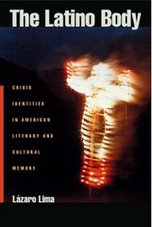Tuesday, April 24, 2007
Written on the Latino Body: Of Tattoos and Discrimination in the Military
The New Mexico National Guard is overwhelmingly comprised of Chicanos. After they arrived in Kuwait recently, a soldier from Wisconsin told superiors that he believed the Chicano servicemen were "gang-members." After an Army specialist was flown in to investigate and examine their bodies, they were stripped and searched for tattoos. Few tattoos were found, and none with gang-related markings.
While Gov. Bill Lopez [sic] Richardson of New Mexico praises the Minute Men gangs along that state's border with Mexico, he seems unable or unwilling to decry the racialized profiling of Mexican American National Guard soldiers in Kuwait under the Army's leadership. (See a video of the alleged "gang-members" prior to deployment above. For original source see here.)
N.M. Guard unit alleges racial discrimination
By ASSOCIATED PRESS
April 23, 2007
Task force says Army searched soldiers for tattoos because they’re Hispanic
ALBUQUERQUE — At a base in Kuwait last May, nearly 60 members of a New Mexico National Guard unit were told to remove their shoes, socks and shirts so that military investigators could check them for gang tattoos.
Several members of the Rio Rancho-based Task Force Cobra alleged racial discrimination, saying the unit was targeted because of its large number of Hispanics.
Army investigators, however, found that the tattoo search was lawful and not racially motivated, the Albuquerque Journal reported in a copyright story published Sunday.
“I’m embarrassed to say that’s how the Army is,” said Adjutant Gen. Kenny Montoya, who commands the Army and Air National Guard in New Mexico. “They don’t want to admit mistakes.”
Within days of the search, Montoya wrote to a senior Army officer in Kuwait, requesting an apology be made to Task Force Cobra. None was given.
Montoya was more pointed in a letter the following month to Gen. Peter Schoomaker, then-chief of staff of the Army. “Let me know how I can help our Army to end their discriminatory practices, both now and in the future,” Montoya wrote.
Schoomaker didn’t respond.
The tattoo search was based on an uncorroborated allegation made by a Wisconsin soldier that Task Force Cobra was rife with gang members.
Members of the military are prohibited from taking part in gang-related activity if the gang is an extremist organization — for example, it advocates discrimination, hate crimes or violent acts. A soldier can face disciplinary action, including discharge for having a tattoo of an extremist group.
On May 25, 2006, agent Paul McGuire with the Army’s Criminal Investigation Command arrived at the Ali Al Salem base in Kuwait to conduct the tattoo check and immediately was confronted about his expertise in identifying gang tattoos.
A lieutenant with Task Force Cobra told the agent that all of his platoon sergeants had backgrounds in law enforcement and would know if gang activities were occurring.
Nevertheless, the soldiers were ordered to strip down to their athletic shorts.
Six of the 58 soldiers initially refused to be searched but complied after being threatened with arrest and charges by the investigating agent.
One New Mexico soldier complained “that he didn’t feel like an American today,” according to Army documents. Another reportedly cried, saying it reminded him of a similar incident that occurred when he was younger because he was Hispanic.
Another soldier said the “Gestapo-like” tattoo check was the lowest point of his military career.
“During the viewing, there was high tension among the troops who related they felt as though they were being picked on ... because they were Hispanic and National Guard,” McGuire later said.
Task Force Cobra is made up of nearly 190 soldiers from various National Guard units around New Mexico. It was deployed in November 2005 to provide security for military convoys in Iraq, Kuwait and Qatar, and returned last November.
Additional members of the group were scheduled to be searched, but unit leaders and senior Army officers blocked that plan.
Capt. Ivan Forrest Salkin, the commander of the unit who had been visiting another base, ordered that there would be no more checks until the investigating agent produced a search warrant, Army documents state.
He said he had no idea that the tattoo check was an issue with his soldiers. He also objected to his soldiers being threatened with arrest for refusing to comply.
As word of the tattoo search worked its way up the chain of command, a top Army lawyer also expressed concern.
“It is too easy for this to be viewed as a witch hunt, where all of the unit members are presumed guilty until proven innocent,” Col. Ralph M.C. Sabatino, a judge advocate, wrote in an e-mail to McGuire a day after the search.
“The fact that all of this is being done on the uncorroborated vague and nonspecific accusations of a soldier ... only exacerbates the problem,” Sabatino said.
Labels:
discrimination,
Latino Body,
National Guard,
New Mexico,
tatoos
Subscribe to:
Comments (Atom)

